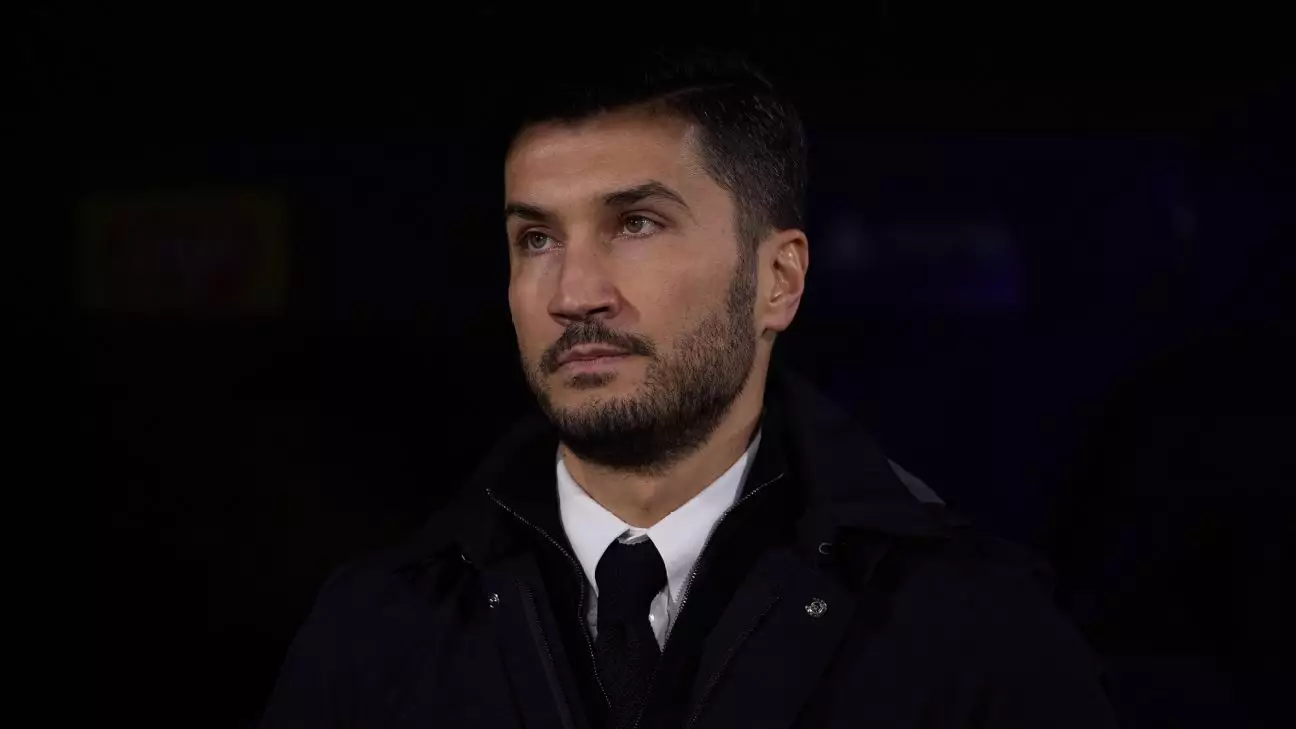The recent dismissal of Nuri Şahin from his managerial role at Borussia Dortmund has sparked a myriad of discussions regarding the club’s trajectory. A little over a year after taking the reins from Edin Terzić—who himself had been under the spotlight—Şahin embarks on an unexpected exit following a disappointing run of performances. His appointment was marked by a wave of optimism; club executives believed that the former midfielder could revitalize the team, instilling a fresh identity in a squad that had become mired in a predictable playstyle. However, as the season progressed, it became evident that skeptical predictions about his readiness were closer to reality than the initial hopefulness.
Despite carrying promise, results have spiraled downwards under Şahin’s guidance. The team’s current standing is indicative of broader issues that have plagued the Westfalenstadion. A paltry 13th place in the UEFA Champions League league phase, combined with a disheartening 10th place in the Bundesliga, highlights that the club is moving further away from its aspirations, particularly when it finds itself languishing 20 points behind leaders Bayern Munich.
Şahin’s dismissal wasn’t merely a reflection of a string of poor results but a culmination of broader systemic failures within the club. Lars Ricken, CEO for sport at Dortmund, was candid when discussing the club’s struggles, citing a significant lack of confidence in the current setup. While speculation around potential replacements, such as Niko Kovač, Urs Fischer, and Roger Schmidt, has illuminated possible paths forward for the team, there are deeper-rooted problems that need addressing.
The performance metrics reveal that Şahin inherited a team that had been poorly structured. Although he showcased initial intentions to create a possession-based style of play that would allow for more flexibility and territory gain, these aspirations faded into the background within only a few matches. The return to Terzić’s reactive approach—a strategy that worked sparingly against top-tier teams—was met with limited success. Over time, the results illustrate a fragmented identity, exhibiting the inability to execute both defensive and attacking manoeuvres effectively.
Moreover, Matthias Sammer, a former player and manager at Dortmund, stated after a crushing defeat against Bologna that the team appeared to be out of shape both physically and mentally. With an alarming trend of consecutive defeats, it is evident that mental fortitude is lacking. Players seem intimidated, unwilling to take risks, and burdened by a psychological stasis that has hindered their ability to perform at their best. At this juncture, pointing fingers solely at Şahin overlooks the glaring lapses in player performance, strategic foresight, and overall team resilience.
There’s a compelling argument to be made that the club’s succession of managerial changes since 2018 has angered and confused the squad. Consistency is often a vital ingredient in any successful team environment, and the revolving door of leadership at Dortmund has contributed to a sense of uncertainty. To some degree, the players have become accustomed to blaming the coach when things go awry rather than taking ownership of their performances.
Additionally, the caliber of newly recruited players has emerged as another pivotal concern. The lack of significant contributions from summer signings, other than Jamie Bynum and Felix Nmecha, has only compounded the team’s woes. This is startling given that Dortmund’s squad remains one of the most expensively assembled in the Bundesliga. Parallels can be drawn with clubs like Manchester United, who have, despite significant investments, found themselves trapped in cycles of mediocrity due to poor recruitment strategies and a failure to foster younger talent.
Leadership on the pitch, particularly from figures like Emre Can and Julian Brandt, has also been underwhelming. Their inconsistency and inability to rally teammates indicate a vacuum of leadership that exacerbates the chronic issues dagging the team. The absence of vital figures like Marco Reus and Mats Hummels, who have left for various reasons over the past few seasons, has further diluted the club’s competitive spirit.
Looking ahead, Borussia Dortmund’s remedy might involve more than just a managerial change. The blank slate that comes with Kovač—if appointed—may only serve to treat the symptom rather than addressing underlying ailments. However, a shift in mentality amongst the players is imperative. A culture of accountability and resilience needs to be nurtured if the club wishes to reclaim its stature in European football.
Ultimately, while Nuri Şahin’s departure may open a new chapter for Dortmund, it comes with the realization that the challenges lie far beyond merely selecting the right coach. The responsibility is shared among them all: the players, the management, and their recruitment team, if they are to emerge from the ongoing tempest and return to a path of glory.

